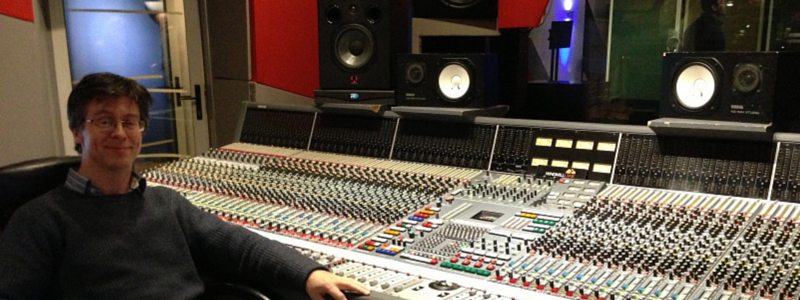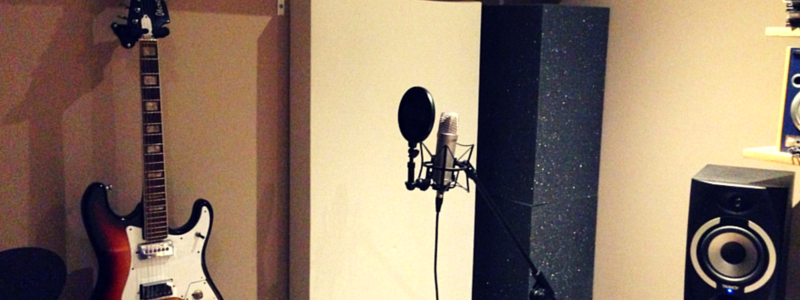ALUMNUS INTERVIEWS
Name: Paul Enright
Course: Music Production for Games
Year of Graduation: 2014
Paul graduated in 2014 from the one-year Music Production for Games course, and now owns and runs Byzantium Audio, a personal studio space where he has created music and sound for short films, documentaries, commercials, and corporate projects. Paul is currently working on a short film called ‘The Raven’. Paul talked to us about how he is getting on since graduating, his thoughts on the course, and how he finds the working environment for composers.
Why did you choose to study at Pulse College?
I guess I was looking for options that would give me the ability to develop my musical and creative skills, but which would also allow me to continue to use the technical and client-facing skills that I have picked up from my previous career in Engineering and IT. I wanted a course that was up-to-date, practical, focussed on composition and technology, and didn’t last more than one year. The Music Production for Games course fitted the bill in terms of those requirements. In fact, think it was the only course I could find in Ireland that fitted those requirements. And I was not disappointed, I really enjoyed the course – there were some days and I thought – woudn’t you just love to do this forever!
How did Pulse College prepare you for your career?
This is going to sound strange but what I liked about the Music Production for Games course is that is not only about games – and I think this is a good thing! I think it is firstly about music composition for visual media, and the technicalities of how music is produced. It then later brings in the added compositional and technical complexities that arise in creating music for games, where, unlike film and other linear media, you don’t know what the time-frame is, or even the context! What I also loved about the course is that there is a lot of analysis of classic and modern film music, a study of the greats, how their music is put together and why it moves people. So the course is well structured, gives you a good grounding in the technical skills you will need, and leaves you with references to resources that you can continue to study.
In terms of how well it prepares you for a career, skills-wise, there is only so much a course can do in one year – it can give you a really good start – there is of course always much to learn and improve afterwards, indeed it is a life-long process, which is what is great about it too. In terms of preparation for a career, what you will need is the ability and perseverance to build up a network of relationships, and that will be all down to you!
What is a normal day of work?
If I am working on a project, most of the day will be spent working intensely on that. If I am between projects, most of day will be spent trying to uncover new avenues and sources of work. In terms of a lifestyle, it is probably worth noting for people that may be interested in a career as a composer, that it is a fairly solitary career, and you will be on your own a lot in a studio, so you would need to be comfortable with that. But the upside is there can be a lot of freedom. I have been lucky to have worked on many different types of projects: short films, mini-documentaries, some animation, some advertisements / promotional videos, music for meditation, some voice-over recordings, sounds for a health and sleep app.
What would you say are the top requirements for someone entering the industry?
I think to be successful, you need to have the potential to become very good, you need to be a nice person, you need to have a real interest in the projects and people that you are going to be working with, you be able to compromise and not have too much ego. You need to have the ability and willingness to be constantly selling yourself and making connections without being an ass and being off-putting. You need to be willing to work really hard and long hours, constantly improve, never give up, Apart from that, it’s quite easy really!
What are the major changes you see happening in the industry?
Well, the big change in the general music industry has already happened a few years ago, in that there is no longer a physical consumer product, or even an electronic product, that can generate sufficient revenue, apart perhaps from large AAA console games. On the music generation front, there has also been a massive democratization, in that anyone with a reasonable amount of money can theoretically generate high quality content from their bedroom. This is great in terms of reducing barriers to entry, but it also means there are millions of people doing it, and we are awash with content and competition, and you getting noticed in all that is much harder. This all sounds very gloomy, but one up-side is that if you want to be a composer, it does not require as much effort or study or money or talent as it used to back in the days when you had to imagine it all in your head and write it down on enormous sheets of paper, and have it played by an 80-piece orchestra!. Despite the fact that you are competing in a very crowded marketplace, if you are really good and work very hard and build connections, and persevere (and have some luck along the way!) there is no reason you cannot make it as much as the next guy.
Check out more on Paul at his website, Byzantium Audio.
Find out more about our Music Production for Games program
[openday]
Follow Us


